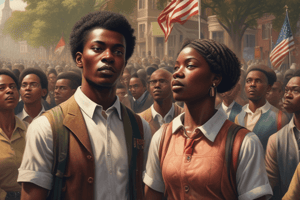Podcast
Questions and Answers
What was the main goal of the Civil Rights Movement in the United States?
What was the main goal of the Civil Rights Movement in the United States?
- To advocate for the rights of African Americans and other marginalized groups (correct)
- To promote racial segregation
- To enforce stricter immigration laws
- To establish separate but equal treatment for all races
Which event led to the U.S. Supreme Court ruling that bus segregation was unconstitutional?
Which event led to the U.S. Supreme Court ruling that bus segregation was unconstitutional?
- The Plessy v. Ferguson ruling
- Montgomery Bus Boycott (correct)
- The Freedom Rides
- Brown v. Board of Education
What was the significance of the Brown v. Board of Education case?
What was the significance of the Brown v. Board of Education case?
- It declared racial segregation in public schools to be unconstitutional (correct)
- It supported segregation in interstate travel facilities
- It reinforced racial segregation in public schools
- It established the 'separate but equal' doctrine
Who organized and participated in the Freedom Rides to protest segregation in interstate travel facilities?
Who organized and participated in the Freedom Rides to protest segregation in interstate travel facilities?
What was the main demand of the March on Washington for Jobs and Freedom?
What was the main demand of the March on Washington for Jobs and Freedom?
What was the significance of the Civil Rights Act of 1964?
What was the significance of the Civil Rights Act of 1964?
What role did Martin Luther King Jr. play in the Civil Rights Movement?
What role did Martin Luther King Jr. play in the Civil Rights Movement?
What impact did the Civil Rights Movement have on American society?
What impact did the Civil Rights Movement have on American society?
Flashcards are hidden until you start studying
Study Notes
Modern History: Civil Rights Movement
The Civil Rights Movement, also known as the Civil Rights Era, was a period of social activism and political progress in the United States that lasted from the mid-1950s to the mid-1960s. This era aimed to end racial segregation and discrimination against African Americans and other marginalized groups. Key events and figures of the Civil Rights Movement include:
Montgomery Bus Boycott (1955-1956)
The Montgomery Bus Boycott began on December 1, 1955, when Rosa Parks, an African American woman, refused to give up her seat on a bus to a white person. This sparked a wave of protests and boycotts of the city's buses, which lasted for 381 days. The boycott ended when the U.S. Supreme Court ruled that bus segregation was unconstitutional.
Brown v. Board of Education (1954)
Brown v. Board of Education was a landmark case in which the U.S. Supreme Court declared racial segregation in public schools to be unconstitutional. The decision overturned the Plessy v. Ferguson ruling of 1896, which had established the "separate but equal" doctrine.
The Freedom Rides (1961)
The Freedom Rides were a series of coordinated protests against segregation in interstate travel facilities. The rides were organized by civil rights activists, who rode on interstate buses and trains to test the U.S. Supreme Court decision in Boynton v. Virginia (1960), which prohibited segregation in interstate transportation facilities.
Martin Luther King Jr. (1929-1968)
Martin Luther King Jr. was a prominent civil rights leader and Baptist minister who played a key role in the Civil Rights Movement. He led the Montgomery Bus Boycott and was a central figure in the March on Washington for Jobs and Freedom in 1963, where he delivered his famous "I Have a Dream" speech.
The March on Washington for Jobs and Freedom (1963)
The March on Washington for Jobs and Freedom was a pivotal event in the Civil Rights Movement, where more than 250,000 people gathered to demand civil rights and an end to racial segregation. The event culminated with Martin Luther King Jr.'s "I Have a Dream" speech, which called for an end to racism and equality for all Americans.
The Civil Rights Act (1964)
The Civil Rights Act of 1964 was a landmark civil rights and labor law in the United States that outlawed discrimination based on race, color, religion, sex, or national origin.
The Civil Rights Movement played a crucial role in the development of modern American society, as it brought about significant changes in laws and attitudes towards race and civil rights. The movement inspired similar struggles for civil rights and social justice around the world, and its legacy continues to be felt today.
Studying That Suits You
Use AI to generate personalized quizzes and flashcards to suit your learning preferences.




